By Assunta Ng
NORTHWEST ASIAN WEEKLY
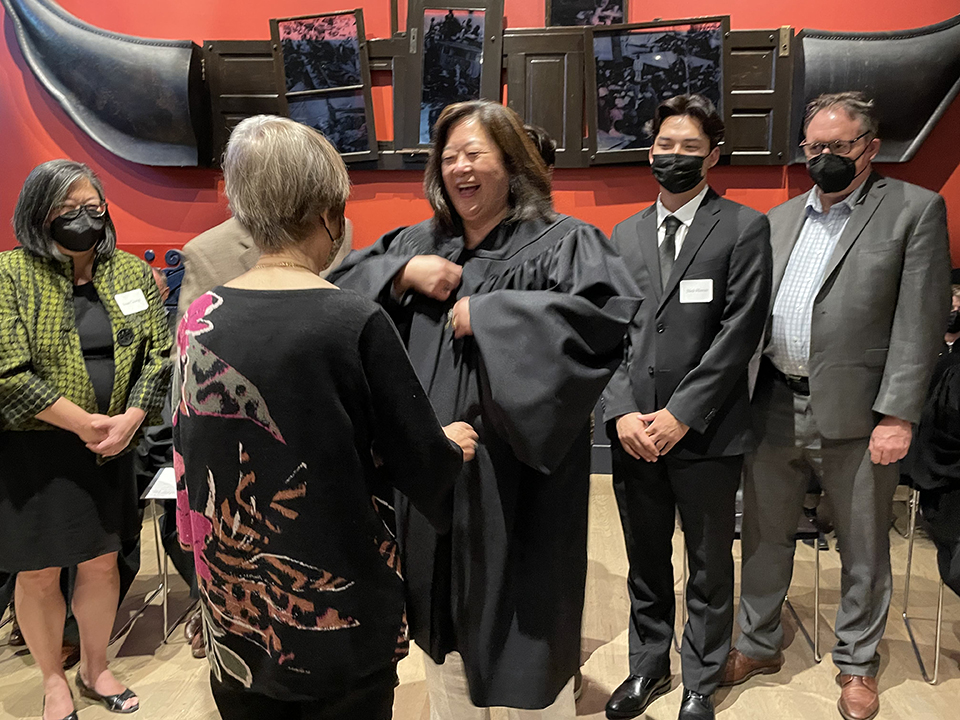
Judge Janet Chung’s mother Helen helped Chung to put on her judge’s gown. (Photo by Assunta Ng)
The path Judge Janet Chung blazed for herself to serve on the bench has never been conventional. And her story serves as inspiration for immigrants and women that, no matter how impossible the obstacles may seem, anything is possible.
Chung, 53, is the first Korean American female out of 22 judges in Washington state to serve on the Court of Appeals. Unlike many judges whose careers started from lower courts, Chung has never been a judge. Yet, her appointment to the Court of Appeals from Gov. Jay Inslee is only a step away from the Washington State Supreme Court. The three-person appeal court has the authority to reverse (overrule), remand, modify, or affirm the decision of the lower court.
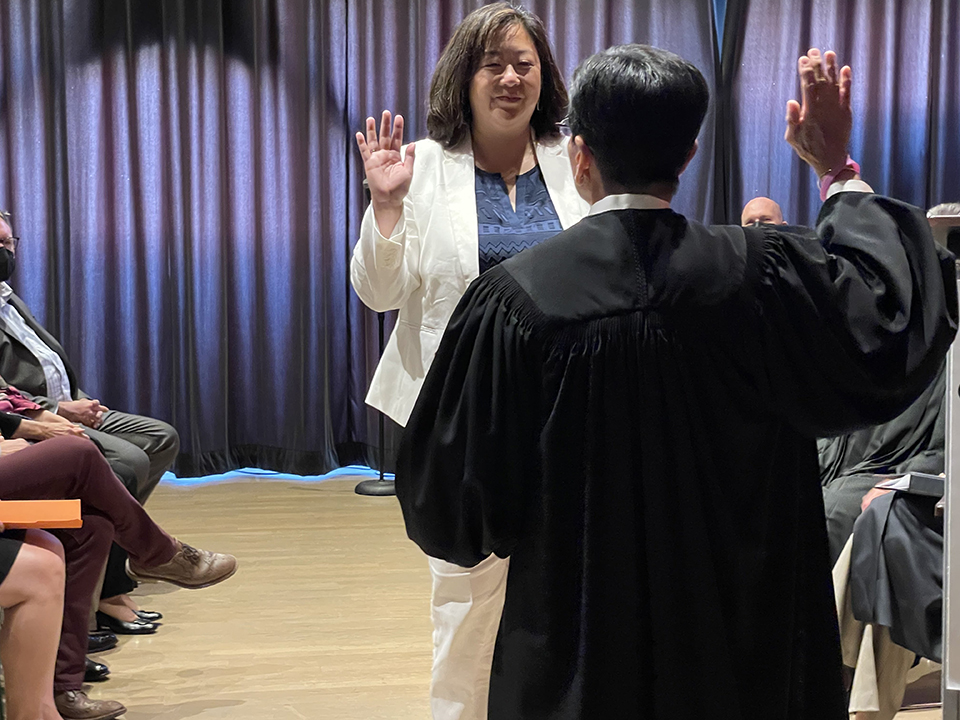
Justice Mary Yu swore-in Judge Janet Chung (Photo by Assunta Ng)
Chung’s immigrant parents were both physicians who were among the privileged few who were allowed into the U.S. from Korea in the early 1960s to help fill an American shortage of medical professionals at the time,” said Donald, Chung’s brother, at her swearing-in ceremony at the Wing Luke Asian Museum on Aug. 25.
But Chung didn’t follow in her parents’ footsteps to be a doctor. Donald joked that his parents were present at the swearing-in ceremony “as testament to the fact that they have finally forgiven Janet for not going into medicine.”
Chung’s life adventures began at age 11. She wrote in her notebook, “My greatest ambition…in my life is to be a lawyer…I like the idea of standing up for what you think is right, and, also, for what others think…In that way, I would be able to help other people, ” according to Donald.
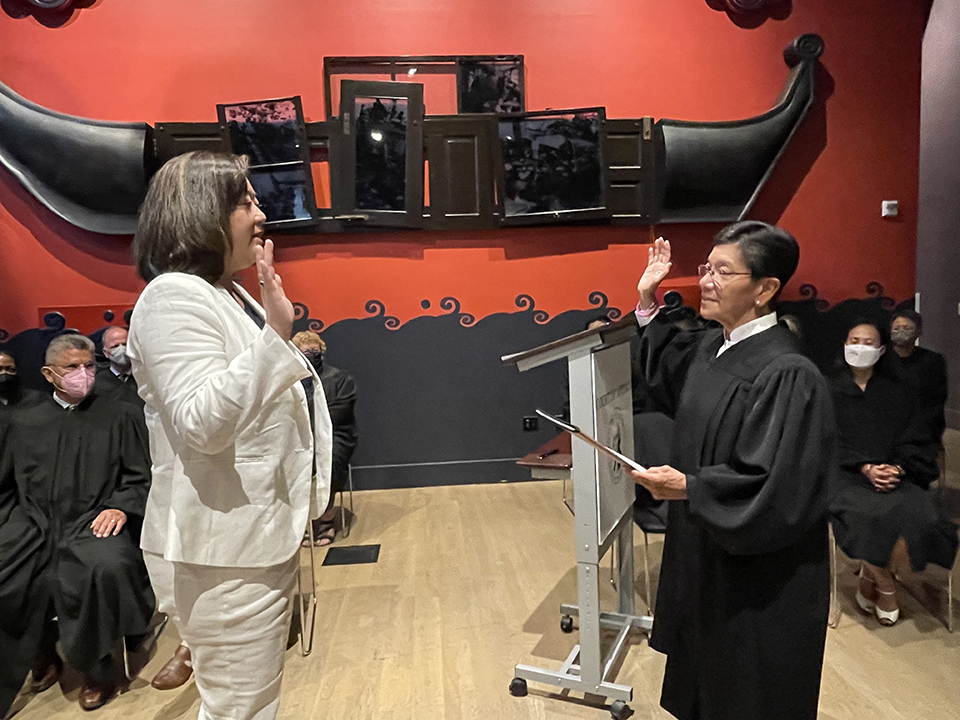
Justice Mary Yu swore-in Judge Janet Chung (Photo by Assunta Ng)
How many of us knew what we wanted to do in life at that age? Perhaps, when we are much older. And if we knew what to do, the obvious choice would be determined by financial reward? Ahead of her youth, Chung thought of the impact she would affect instead.
That same year, Chung became an entrepreneur. She started her own bi-weekly publication to report on her family history and neighborhood events. As publisher, editor, and reporter, she even recruited her older sister and younger brother to write.
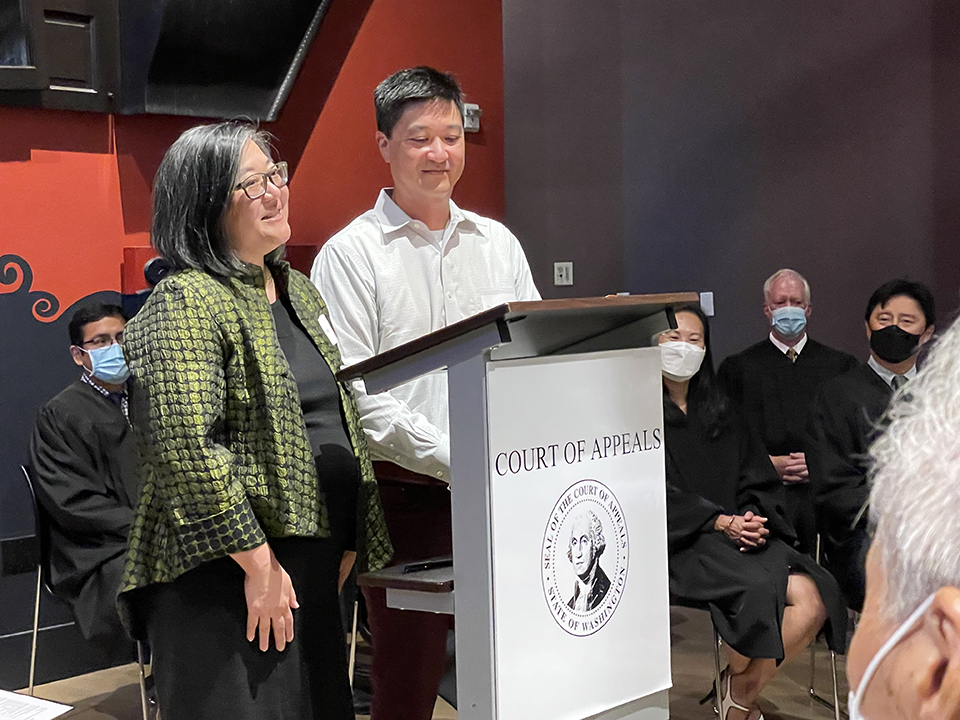
Judge Janet Chung’s siblings, Susan and Donald, shared stories of their Janet’s childhood (Photo by Assunta Ng)
Despite the fact that Chung didn’t join the medical field, she drew inspiration from her parents‘ stories, especially her maternal grandmother, Halmony, who was widowed at 27. She “worked as a single mother to raise her daughter,” said Donald. “She had to rely on her own resourcefulness and perseverance through two wars,” and “eventually send our mother to medical school.”
“She carries forward a legacy dedicated to creating opportunities,” said Chung’s sister, Susan.
Indeed, a legacy not only creates possibilities for marginalized people including immigrants, women of color, and LGBTQ, and herself, too. “I am interested in helping people to move through the system,” she said.
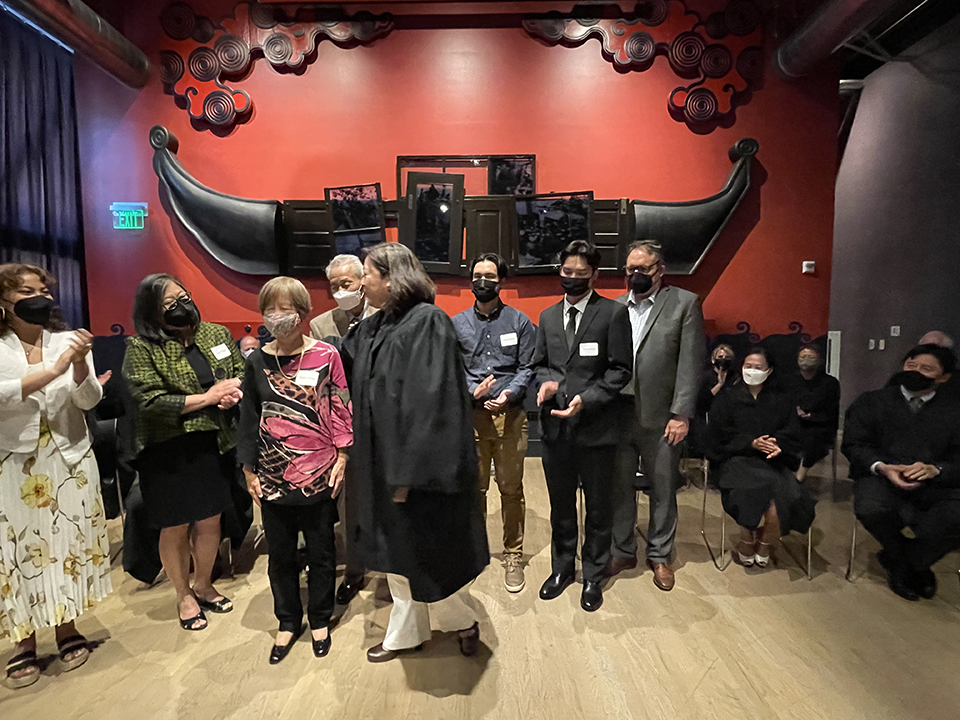
Judge Janet Chung’s family (Photo by Assunta Ng)
Not the usual career path
Born in Maryland, Chung was raised in Houston, Texas, and she received her bachelor’s degree from Yale University and her law degree from Columbia University School of Law.
Most judges follow the conventional moves by running for lower courts, such as Municipal and Superior Court, or getting appointed.
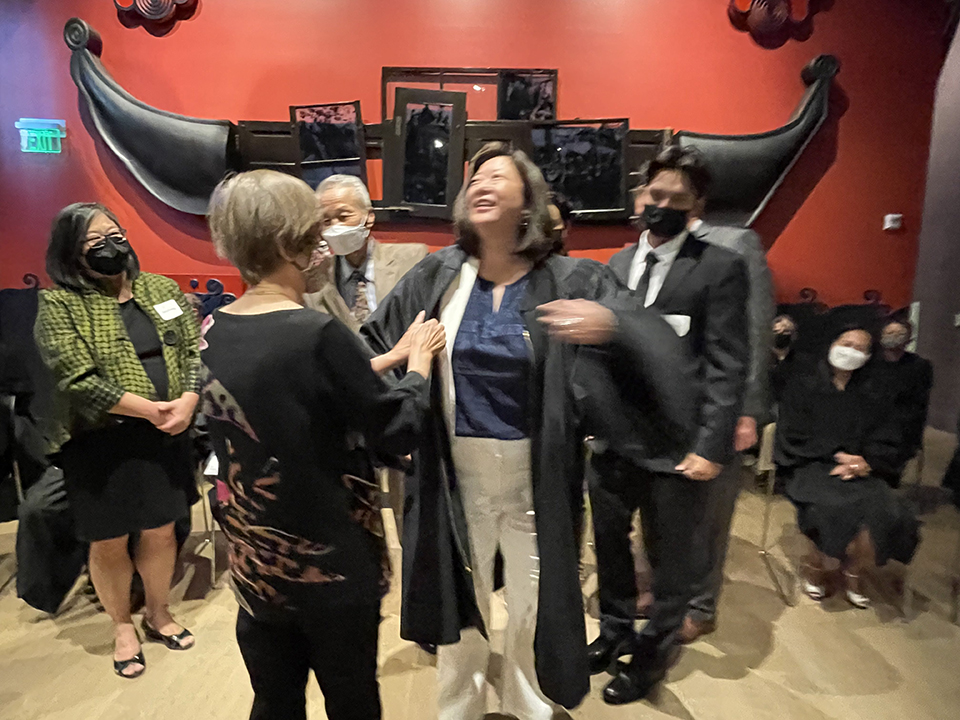
Judge Janet Chung’s parents, Oliver and Helen, help Chung with her gown (Photo by Assunta Ng)
Chung agreed that she has not taken a traditional route to get to where she is.
“I never thought of going through the superior court,” said Chung. She said the appeals court requires a different skill set, not trial experiences like picking juries and sentencing.
It’s not a requirement though. “Most of the judges were not trial judges,” said Washington Supreme Court Justice Mary Yu, who was a former King County Superior Court judge. “It is only recently that governors are recognizing the importance of having judges at the appellate level” with other kinds of experience.
From being a law professor to legal counsel for nonprofit agencies, Chung’s experience spanned the private and public sector. But much of her career was in the nonprofit sector for public interest. She was the legal and legislative counsel at Legal Voice (formerly the Northwest Women’s Law Center). Its mission is to advance and defend the rights of women and LGBTQ+ people in the Northwest, in the courts and in the legislature.
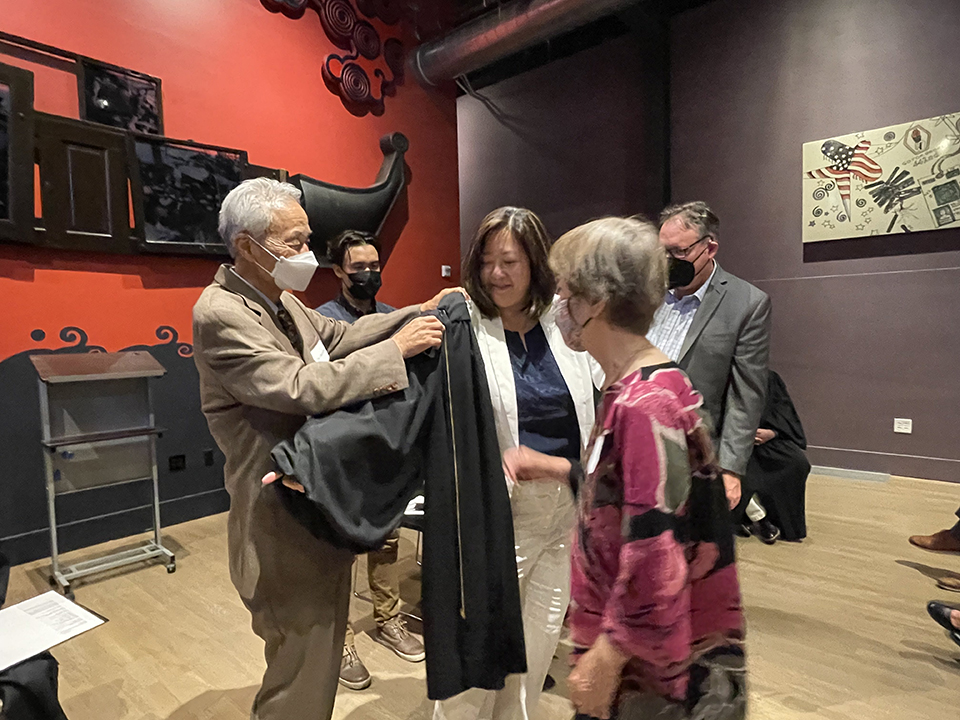
Judge Janet Chung’s parents, Oliver and Helen, help Chung with her gown (Photo by Assunta Ng)
“Janet left her mark on the law in so many ways,” said attorney David Ward, who worked with Chung at Legal Voice. “She wrote statutes and won cases to protect the rights of pregnant and parenting people. She helped to strengthen anti-discrimination protections and to make sure that more workers had the right to paid leave when they needed it. She protected the reproductive rights of people in Washington, Idaho, and other states in the Northwest.”
In an article from the Bar Bulletin, Jamila Johnson depicted Chung as a “policy maven” who has been an advocate for disadvantaged people, and “has been a regular in the rooms where cutting-edge policies are formed.”
Chung was also the advocacy director at the Columbia Legal Service (CLS), a state-wide agency. “Janet was an exceptional person, intelligent, hardworking, and committed to social justice,” said her former colleague Blanca Rodriguez, deputy director of Advocacy at CLS.
“She was always supportive of me and other women lawyers.” She believes “diversity matters,” according to Rodriguez.
How women can get what they want
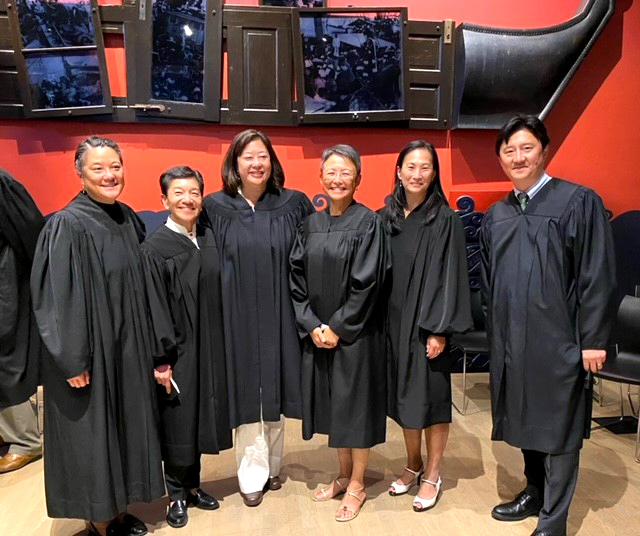
From left: Judge Linda Lee (Court of Appeals), Justice Mary Yu (Supreme Court), Judge Janet Chung (Court of Appeals), Judge Linda Coburn (Court of Appeals), Judge Tana Lin (Federal Court – Western District of Washington), Judge John Chun (Federal Court – Western District of Washington). (Photo courtesy of Mary Yu)
Studies have found that “women of color often do not take positions unless they are asked or encouraged,” said Chung. According to an MIT study by Prof. Danielle Li, women are less likely to ask for promotions.
In another study, Prof. Kelly Shue and co-authors have found that “women got higher performance ratings than men but were consistently—and incorrectly—judged as having less leadership potential.
Lack of confidence is an issue for women, said Chung.
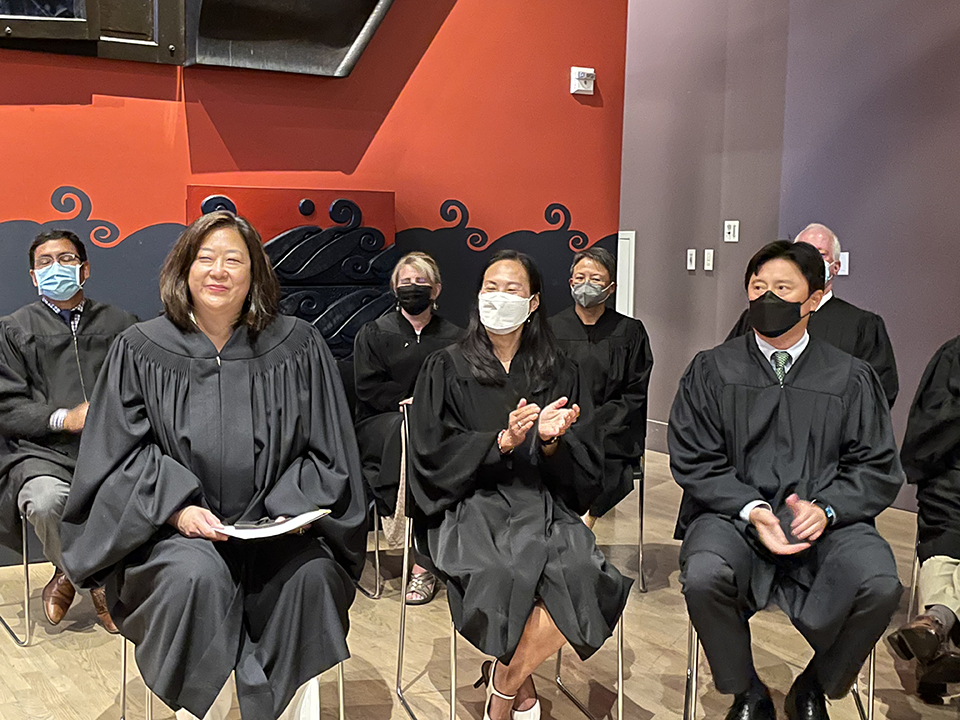
From left: Judges Janet Chung, Tana Lin, and John Chun (Photo by Assunta Ng)
“If younger attorneys can apply, why not me?” Chung said, while some women would respond, “I could never do that.” She knew what her goal was and pursued it. She set her sights on the Appeal Court for a couple of years, and prepared herself to get appointed.
“Listening, asking questions,” said Chung, are important for women to get what they want.
“Stop being afraid to ask questions, and navigate how to be taken seriously,” she said. “Being credible, always learning. Don’t need to pretend (you know everything). You have to put yourself out there. Get the information.”
Chung said, you may be surprised that others might not have the answer to everything.
“Sharing vulnerabilities is connecting.
“Find mentors to support you,” she said. “I have a lot (of mentors)…my colleagues, and Justice Yu is one of them.“
And the timing was right for Chung this year. When a couple of positions opened this year due to retirements, Chung was confident in galvanizing support and references, beating her competition. The governor’s office doesn’t often reveal the number of applicants competing for the job, and Chung guessed there were a dozen other candidates. And the outcome couldn’t be more satisfying as she is running unopposed in the November election, sparing the pain of running a campaign and getting her name introduced to voters. Chung is fulfilling retired Judge Marlin Appelwick’s term. She has to run again two years from now. Earlier, Chung said she had anxiety that she might have an opponent because “women, and especially women of color, are seen as vulnerable.”
Chung, the teacher
What kind of teacher was Chung as a law professor in legal writing at the Seattle University Law School (SULS)?
”It’s one thing to receive a marked up document and have to figure it out on your own, and it’s a whole other thing when your legal writing professor sits down and works through the memo sentence by sentence,” wrote a former student, an immigrant woman of color, about Chung. “The time Judge Chung spent with me was life affirming.”
Chung’s job was to supervise interns and externs to develop them into lawyers.
“Judge Chung is a successful litigator and lobbyist; a passionate advocate for social justice…a teacher, mentor, and role model,” said Mimi Samuel, associate Professor of Lawyering Skills at the SULS.
“She helped give [students] the tools that they would need to be successful in their law studies,” said Samuel.
Non-traditional swearing-in
This was not a typical swearing-in ceremony for Chung and for the audience. It was not at a courthouse, but in the Chinatown-International District.
Supreme Court Justice Mary Yu swore Chung in, and Chung’s whole family including her parents helped her put on a robe while her sons, siblings, and partner shared the stage.
Never had I seen so many judges (close to 20) attending the swearing-in ceremony of a colleague. Several of them were from the Supreme Court, and Asian American judges were well represented in the room. It was an empowering experience for the audience as well as this reporter.
“Where do I want to be (for people) to understand my journey?” said Chung. The Wing Luke Museum flashed before her eyes. Many have never visited the Wing before.
“Bringing people to see our community,” said Chung and also “giving money back to the community,” were the reasons she picked the Wing.
Chung “could not have found a better location for her swearing-in ceremony, a museum dedicated to an Asian American who fought for civil rights and social justice,” said Rodriguez.
Chung had her official swearing-in much earlier. The ceremony at the Wing was designed for her family, colleagues, and community. From the venue to the catering, programmed to a diverse guest list of the powerful and ordinary, serious speeches to funny and heart-warming anecdotes, they were an indication of Chung’s personality and approach in her work. If that’s the case, we can expect she would have a very different perspective contributing to the Court of Appeals with humanity, lessons, and insights for generations to come.
Assunta can be reached at assunta@nwasianweekly.com.



